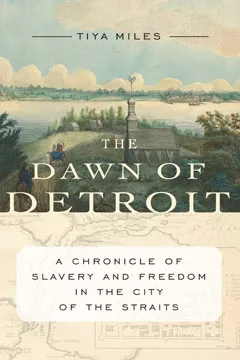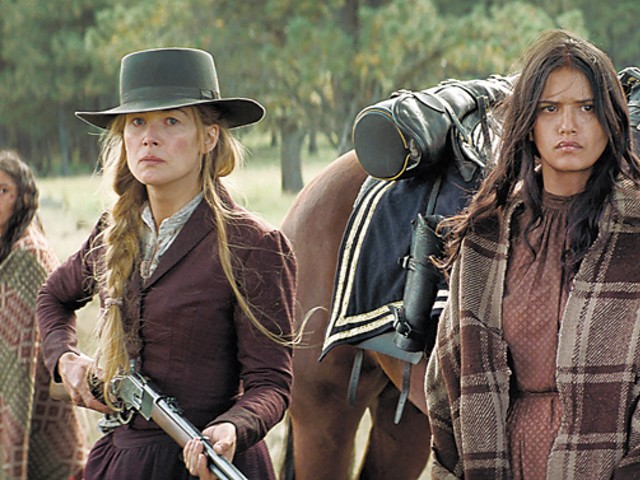In metro Detroit, we're used to thinking of slavery as something that took place far away among the plantations of the antebellum South. After all, Detroit was the last stop on the Underground Railroad, a magnet of the Great Migration, and eventually the sophisticated Motown of the civil rights era. But it wasn't always that way, as one of the last year's most notable Detroit history books makes plain.
That book is called The Dawn of Detroit, and it's by University of Michigan history professor Tiya Miles. It offers a look at Detroit's early years, roughly 1760 to 1815, a time when not everybody was free, and when Native Americans, Africans, and indentured servants were considered the property of some of Detroit's first families.
We spoke with Miles in anticipation of her appearance this Saturday at the Detroit Public Library's Main Branch in Detroit.
Metro Times: How did you get interested in that subject? Did you discover it or set out looking for it?
Tiya Miles: I teach a seminar in our Afro-American and African Studies Department on slavery and representations of slavery in contemporary America, and I always try to incorporate some kind of field trip. Around 2009, we took an Underground Railroad tour of Southeastern Michigan organized by the African American Cultural and Historical Museum of Washtenaw County. For me, it was an introduction to the rich local history from this time period. I was learning all kinds of new things right alongside the students, and I decided to follow up on Laura Smith Haviland, who was an abolitionist who lived in what's now Adrian. But as I was doing that research, I learned from reading her own memoir that there may be more to Michigan history than I'd realized.
Basically, she was very proud of being a Michigander, and she talked about these "laws of Michigan" that were in favor of black freedom, and so I started to try to look into these laws that she was referring to. When I went down that path, it was like a rabbit hole, and it led me to look more closely at the Northwest Ordinance, and to the realization that while the ordinance officially and formally seemed to ban slavery in the Northwest Territory, it actually allowed for slavery in various guises.
Once I knew that, I felt like I couldn't stop researching that because I'm from Ohio, and I've lived in Michigan for 15 years now, and I'm somebody who has always had an identity connected to the Midwest as a free place, the Northwest Territory as a free place. So when I learned this, I was surprised that I didn't already know it and I was disappointed about it. I was frustrated that there wasn't more discussion about it.
MT: Your book challenges many myths in ways you might not at first realize. For instance, it shatters the myth that we didn't have black people until the Great Migration, with Henry Ford as a sort of Moses figure.
Miles: One of the problems with that story is that it really places African-Americans on the latter half of a historical timeline in Detroit. It suggests that black people came here in the early to mid-20th century, and that's just not accurate, and it displaces a long African-American history in Detroit. It displaces what I think are some of the foundations of African-American resistance and political consciousness in Detroit. But I think that if we have a narrative that positions a white male entrepreneur as kind of an economic savior and black people as a population that came to a place in droves to take advantage of that opportunity, then we actually aren't able to see African-Americans as saviors of their own lives and their own communities.
MT: Of course, you could have just written a story about black history, but chose to include stories of native peoples. Why was that important to you?
Miles: When I first started doing this research, I thought the book would be focused on the 19th century, but the more I started reading I was going to have to go back. And so it kept pushing me backward and backward until I found myself in the 1700s. It became very clear then that the largest population of enslaved people in Detroit were Native Americans, and they were Native American women. Learning that changed the story I was expecting to write. It's impossible to talk about slavery in Detroit without centering on Native American history. And the other piece to that is that enslaved people, when they did attempt to run away, they did so in multiple directions. They had a better chance of not being caught if they ran through Native territory, because the European and Euro-American owners and masters were really afraid of going into Native space.
MT: How did slaves arrive in the region?
Miles: There are different directions by which African-Americans were brought into Detroit. The earliest black people there — and this is all very hard to know because the records just don't tell us anything clearly about it, but the earliest black people there were probably coming from cities in New France like Montreal because some of the earliest Detroiters were coming from these places. And they held slaves. And then when the British came in, many of them were coming from the Northeast and New York, and they brought enslaved people with them from that region, and then the British also entered into sales agreements brokered in New York to buy more African-Americans who were then sent to Detroit. But they were rare. As they were small in number, they were hard to get. The population was not as large as Native American populations were.
But it was during the Revolutionary War period that the most number of black people were captured and brought into slavery in Detroit. So, right when the United States was fighting for its freedom, black people had their freedom taken from them in Detroit.
Miles: I did have a concern with this project and that was that, even though I knew that I wanted to try to find stories of resistance, slavery is not a pretty topic, and I worry that people, particularly people in Detroit, might feel that I was just trying to throw out some more dirty laundry about Detroit, and that worried me. And I was only able to feel more reassured about that as I worked with students. A lot of our students here are from the Detroit area, and I've never encountered students who expressed the feeling of dread or shame or embarrassment hearing that, in a collective sense, we as people of color might have enslaved ancestors in Detroit. Their response was one of indignance and anger that they were never told or taught this.
And they also seized on the idea that people who were enslaved in Detroit, they were able to make a way out of no way, that they were able to persevere despite the most extreme circumstances we can imagine, and for them it was a source of pride and strength. And when I saw how the students were reacting, I was really heartened, because that's how I feel about it too. And so far people who've written to me who are from Detroit have echoed those same sentiments, and I really believe and I'm really grateful that people who have been reading the material kind of feel and understand where the work is coming from.
We can't just turn a blind eye to these events. We can't pretend that we all just got along. Clearly that is not the case. And people have lost their lives because of our inability to recognize and respect one another as human beings. So we need to know about it.
Miles will give a talk about The Dawn of Detroit from 2 p.m. to 5 p.m. on Saturday, Jan. 27 at the Detroit Public Library Main Branch, 5201 Woodward Ave., Detroit; 313-481-1300. More information on The Dawn of Detroit is available from thenewpress.com.







